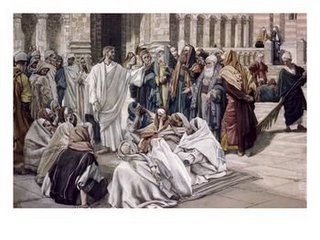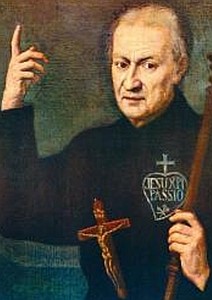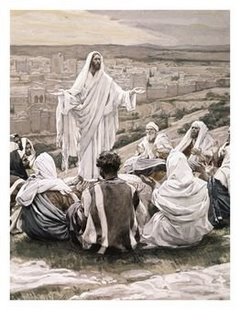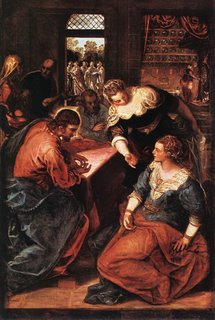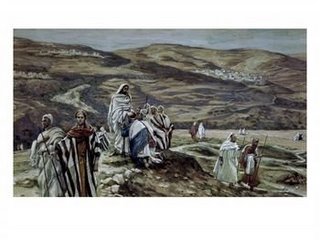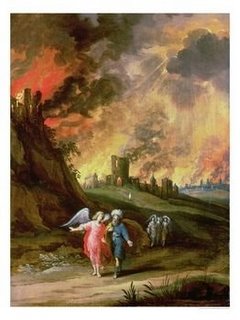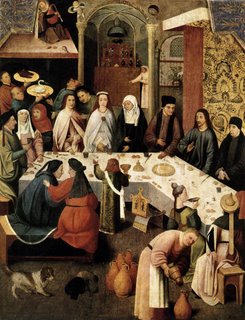
Tuesday of the Thirtieth Week in Ordinary Time
Readings for Tuesday of the 30th Week in Ordinary Time
Reading 1 Eph 5:21-33
Brothers and sisters:Be subordinate to one another out of reverence for Christ.Wives should be subordinate to their husbands as to the Lord.For the husband is head of his wifejust as Christ is head of the Church,he himself the savior of the Body.As the Church is subordinate to Christ,so wives should be subordinate to their husbands in everything.Husbands, love your wives,even as Christ loved the Churchand handed himself over for her to sanctify her,cleansing her by the bath of water with the word,that he might present to himself the Church in splendor,without spot or wrinkle or any such thing,that she might be holy and without blemish.So also husbands should love their wives as their own bodies.He who loves his wife loves himself.For no one hates his own fleshbut rather nourishes and cherishes it,even as Christ does the Church,because we are members of his Body.For this reason a man shall leave his father and his motherand be joined to his wife,and the two shall become one flesh.This is a great mystery,but I speak in reference to Christ and the Church.In any case, each one of you should love his wife as himself,and the wife should respect her husband.
Responsorial Psalm Ps 128:1-2, 3, 4-5
R. Blessed are those who fear the Lord.
Gospel Lk 13:18-21
Reflection:
The reading from Paul today is one that has been much maligned over the past half century. It is pointed at, especially by feminists, as demonstrating how chauvinistic Christianity can be. There is not doubt that many of the conservative groups of Christians, both Protestant and Catholic have taken this passage as the defining passage for roles of man and woman in marriage. They generally miss an important message in their rush to establish a hierarchy of authority.
Where there is generally trouble is that many men who have taken this passage to mean that they have dominance in a married relationship miss the analogy in favor of the words. The analogy is: “For the husband is head of his wife just as Christ is head of the Church”. And how does Christ lead his Church? It is not by making all of the decisions for her and it is not by defining restrictive boundaries for her. Rather, Christ provided the leadership through his own example and his intense love for her, his bride the Church, led him to make the ultimate sacrifice for all those who would one day have the choice to follow and be bride or reject and find loneliness. Ultimately the analogy promotes the covenant relationship which is a mutual bond each sharing with the other all they have.
Rather than focusing on the analogy, which by the way is also the foundation of the Sacrament of Marriage, let us focus on what Paul is saying about mutual respect and the great commandment of Jesus, to love one another. In the middle of all the rhetoric about husbands and wives we find this interesting passage:
Husbands, love your wives, even as Christ loved the Church and handed himself over for her to sanctify her, cleansing her by the bath of water with the word, that he might present to himself the Church in splendor, without spot or wrinkle or any such thing, that she might be holy and without blemish.
Here we find Paul making reference first to Christ’s crucifixion by which he won our freedom from sin making us a holy people (…to sanctify her,). He follows this with a reference to our adoption in Baptism (…cleansing her by the bath of water with the word,) and then concluding that, in our adoption in that baptismal bath we become new, a new creation clothed in himself. We become one in Christ and this is his point both about Christ and the Church and husband and wife, the two become one and one may not divide itself.
And were today is the practical application of this huge thought? For those of us who are married, let us remember our partner is not just another person in our life but joined to us as Christ is joined to and part of the Church. In doing so we must not take for granted that holy bond. For those who are single, look at your brothers and sisters joined to you in the one adoption of baptism – they are your extended family and one should always love one’s family. Of course that goes for us married folks as well, we just have more on our plate.
Pax
